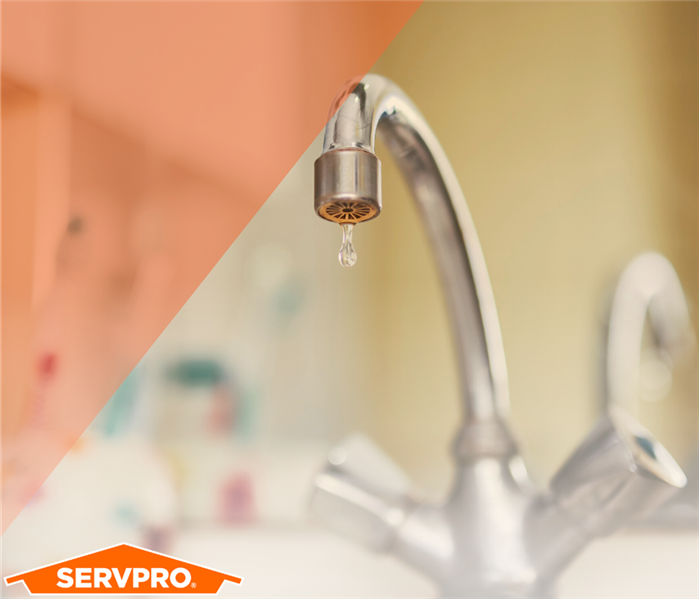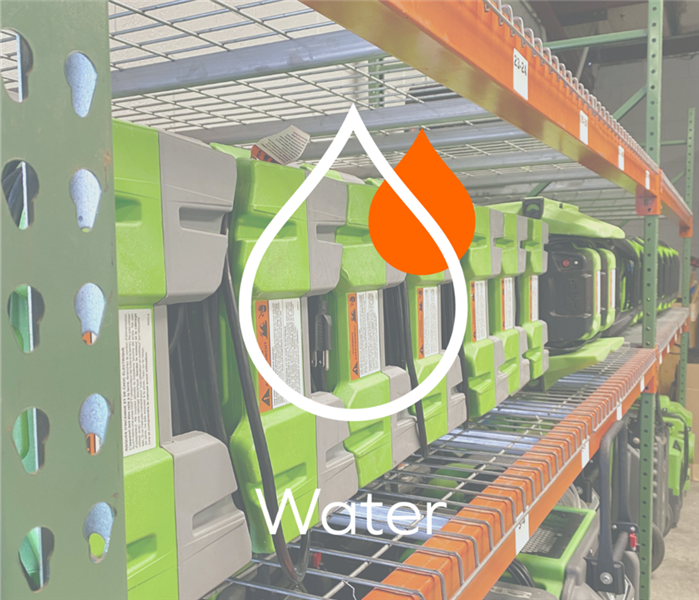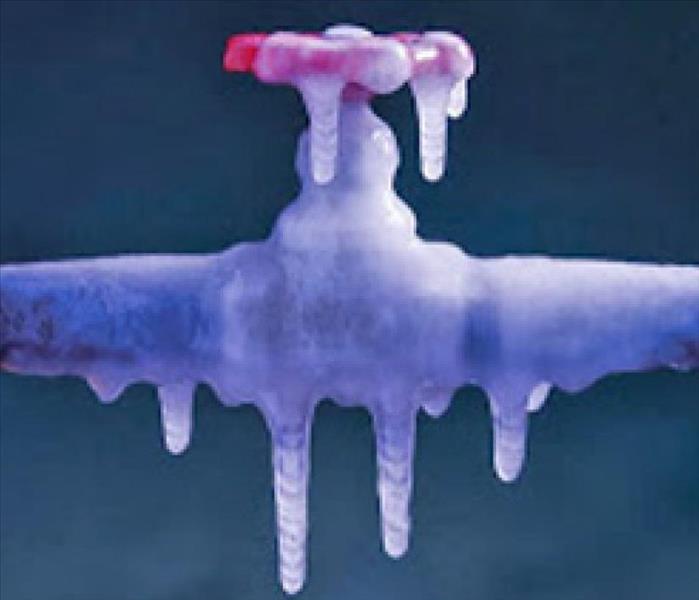Recent Water Damage Posts
Expert Flooded Basement Recovery: 5 Benefits of Our Pros
2/26/2024 (Permalink)
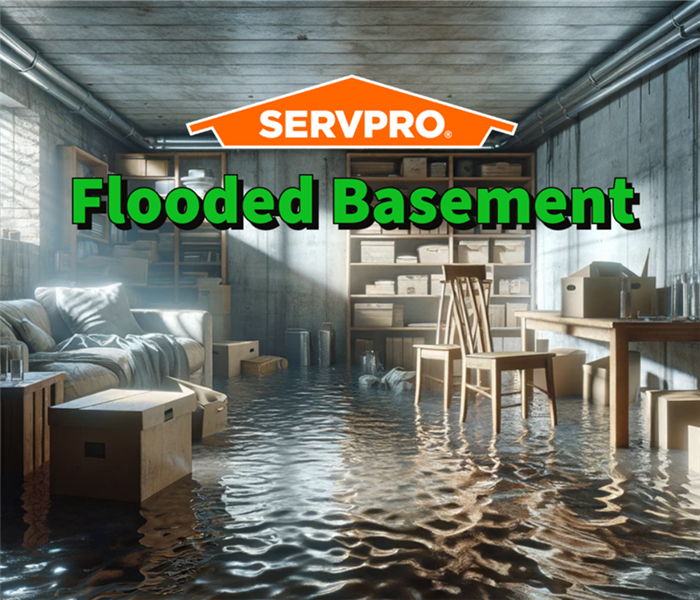 The professionals at SERVPRO are available 24/7 to help combat damages caused by a flooded basement!
The professionals at SERVPRO are available 24/7 to help combat damages caused by a flooded basement!
We can help you navigate the ins and outs of your flooded basement with our years of expertise
Welcome to SERVPRO's comprehensive guide on flooded basement restoration—a critical undertaking for property owners grappling with the aftermath of water intrusion. In this enlightening blog post, we unveil the seven key benefits of entrusting SERVPRO's experts to restore your flooded basement to its pre-damage state. Join us as we delve into a scenario in Gainesville, Georgia, where our SERVPRO of Gainesville team was called to action after a commercial property fell victim to a flooded basement. Witness how our team's swift response and expert techniques ensured that the property emerged unscathed from the deluge, highlighting why SERVPRO® is the preferred choice for flooded basement recovery.
How long does it take for a flooded basement to dry out?
The drying time for a flooded basement can vary depending on factors such as the extent of the flooding, the presence of standing water, and the effectiveness of the drying equipment used. Prompt action is essential to expedite drying and prevent secondary damage such as mold growth and structural deterioration.
What happens if you don't clean a flooded basement?
Failing to clean and properly dry a flooded basement can have serious consequences, including mold growth, structural damage, and compromised indoor air quality. Ignoring the aftermath of a flooded basement can lead to long-term issues that pose health risks and financial burdens for property owners.
From a recent scenario in Gainesville, Georgia:
In the picturesque city of Gainesville, Georgia, a bustling commercial property was besieged by a sudden deluge, resulting in a flooded basement that threatened to disrupt operations and compromise the building's integrity. Recognizing the situation's urgency, the property manager wasted no time contacting SERVPRO for assistance. Our team swiftly mobilized, arriving at the property equipped with advanced water extraction and drying equipment to commence the restoration process without delay. Luckily, the operations continued with minimal disruption, and the building suffered no lasting damage.
5 benefits of calling SERVPRO for your flooded basement
Swift water extraction and drying
Upon arrival at the Gainesville property, our SERVPRO team wasted no time initiating the water extraction and drying process. We swiftly removed standing water from the basement using powerful pumps and industrial-grade dehumidifiers. We implemented thorough drying techniques to eliminate moisture and prevent mold growth.
Thorough cleaning and sanitization
In addition to water extraction and drying, SERVPRO employs comprehensive cleaning and sanitization protocols to ensure the flooded basement is free from contaminants and pathogens. Our team meticulously cleans and disinfects all affected surfaces, restoring the basement to a safe and sanitary condition for occupants.
Mold remediation and prevention
One of the most significant risks associated with a flooded basement is the potential for mold growth. SERVPRO specializes in mold remediation and prevention, utilizing advanced techniques to identify and eliminate mold infestations while implementing measures to prevent future outbreaks.
Structural restoration and repairs
Floodwater can wreak havoc on a property's structure, causing damage to walls, floors, and foundations. SERVPRO's team of disaster restoration experts is trained to assess and address structural damage effectively, restoring the integrity of the basement and ensuring its long-term stability.
Insurance coordination and assistance
Navigating insurance claims can be overwhelming, especially after a flooding disaster. SERVPRO works closely with insurance companies to streamline the claims process and maximize coverage for our customers, providing peace of mind during a challenging time.
Flooded basement? Give SERVPRO a call today!
Choosing SERVPRO for flooded basement restoration is the wisest decision for your property. With our swift response, expert techniques, and commitment to excellence, we ensure that your flooded basement is restored to its pre-damage condition with efficiency and care. Don't let a flooded basement disrupt your life—trust SERVPRO to guide you through the restoration process with professionalism and expertise. With our unwavering dedication to customer satisfaction, SERVPRO is the premier choice for flooded basement recovery. When disaster strikes, count on SERVPRO to be your trusted partner in restoration, empowering you to reclaim your property and move forward confidently.
Advantage to Quick Mitigation for Water Damaged Flowery Branch Homes
10/1/2022 (Permalink)
Water loss incidents can quickly spread throughout your Flowery Branch, GA home and threaten areas even far removed from the source of the emergency. As much as many homeowners might want to handle many of these disasters on their own, water losses can affect areas beyond what is easily seen, requiring sophisticated equipment and mitigation tools to overcome. Without a fast turnaround on the effects on your house, construction materials risk deterioration, and the property also becomes susceptible to hazardous conditions like mold growth.
Professional restoration technicians like our SERVPRO team can offer real-time solutions for water damage to Gainesville homes. We have a broad inventory of equipment, and with the connection to a larger national network, we can continually upgrade and improve our equipment and tools to be the most competitive in the restoration industry.
We know how quickly water loss incidents can get out of control, so we have a 24/7 response to these emergencies to begin mitigation work as soon as our professionals first arrive. Mitigation serves to reduce your overall loss when disasters strike your residence.
Trust in our SERVPRO of Gainesville team to work quickly to make these situations “Like it never even happened.” Give us a call today at (770)536-1010.
Toilet Overflow
9/23/2022 (Permalink)
A flooded toilet can cause damage on one or more floors of a home in Gainesville, GA. You should immediately contact a plumber upon noticing signs of a blocked drain line and take measures to limit sewer damage. Here are some of the types of damage a toilet overflow can cause. Contaminated WaterWater from a toilet overflow is almost always contaminated. Restoration professionals categorize water damage into three categories:
- Category One clean water, originating from supply lines
- Category Two contaminated water, from showers or appliances
- Category Three contaminated water containing solid wasteWater from a flooded toilet is likely either Category Two gray water or Category Three black water. Either category of sewer damage calls for disinfection in addition to cleaning and drying
Now you are capable to prevent future water damage from a leaking toilet. "Black water" damage definitely requires some special procedures for cleaning; fortunately, SERVPRO of Gainesville, professionals are available to restore the damaged area 770-536-1010
Noises of Concern for your Water Heater
9/21/2022 (Permalink)
You may not give much thought to your Gainesville, GA home’s water heater until it starts to malfunction. One major giveaway is certain sounds it might start to make where it ran quietly in the past. While not all of these sounds are cause for alarm, there are a few that may be pointing to trouble or the need for maintenance.
1. Hammering Sounds
If your water heater makes hammering or banging sounds, this may be startling but is usually not a cause for alarm. This means that someone in the family has turned the water off suddenly, which may cause the pipes to vibrate. When this happens, the pipes may knock against the wall. Wrapping them in heat-resistant soft insulation can fix this problem and prevent long-term damage to the wall.
2. Screaming
This sound can also be startling because it sounds like the entire unit may burst at any moment. However, this usually means a valve somewhere in the unit, the lines, or at another connected source may not be closed all the way. If you cannot chase it down, you may want to call a water damage and restoration company to help you find the source of the faulty valve and inspect any lines for damage.
3. Crackling and Popping
If your water heating unit sounds like it is boiling rocks every time it turns on, this may not be too far from the truth. Over time, sediment can build up at the bottom of the tank and cause crackling or popping as the water forces its way through the buildup during the heating process. A water heater flush can rectify this issue.
Some noises your Gainesville, GA, home’s water heater might make can be alarming. However, when you understand their sources, you can take the steps necessary to resolve or repair the problem before it becomes too serious.
Water Removal and Water Extraction
9/2/2022 (Permalink)
The water extraction step removes the majority of the water from your home or property. By performing a thorough water extraction, SERVPRO Franchise Professionals help reduce the drying time and help to prevent mold and secondary water damage. They use powerful pumps and truck-mounted vacuum units to quickly remove hundreds or thousands of gallons of water from your property.
1. Emergency Water Extraction
Highly trained technicians will begin the water removal process almost immediately. Depending on the amount of water, they may use powerful submersible pumps in addition to industrial strength, and wet/dry vacuums. This step helps to reduce drying time and helps to prevent mold and secondary water damage.
2. Inspect Flooring
SERVPRO Professionals will inspect the floor coverings and determine if it should be removed to protect the subfloor.
3. Water Removal Equipment
Water removal equipment is used to remove excess moisture in the air that could cause secondary damage.
Has your property experienced a Water Damage? Call SERVPRO of Gainesville for your free -inspection 770-536-1010
Unexpected Cause of Water Damages
6/28/2022 (Permalink)
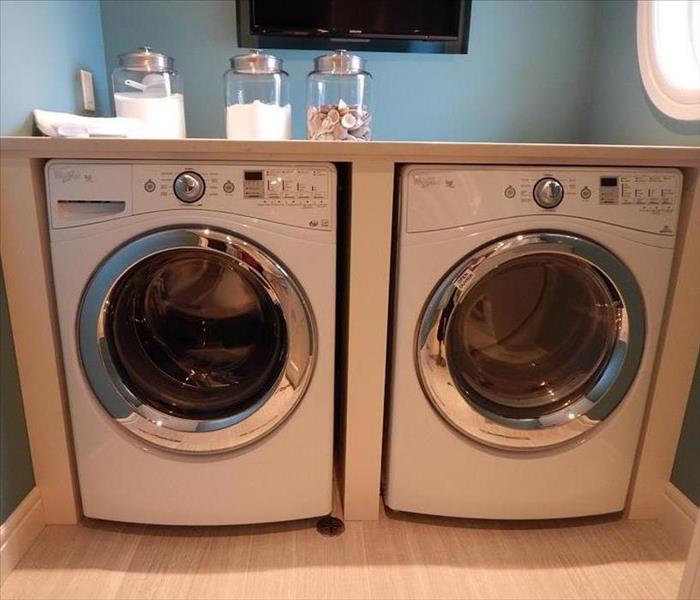 Don't look paste the common areas for water damage.
Don't look paste the common areas for water damage.
Water damage is every homeowner and business owner’s concern. We are all aware that a roof needs to be inspected for signs of damage and plumbing is something to keep your eye on as it ages. These are areas that we would expect to be a problem when it comes to property damage.
But what about your washing machine connections? Hard water deposits can corrode pipes and hoses making your chance for a water damage increase. If the pipe burst while you are away significant damage can happen while your away. Basement could be completely flooded just by a simple supply line connection breaking. Make an inspection of your laundry room part of your routine, and pay attention to all the outlets, hoses, and piping, to make sure they are in working order.
Another part of your house or business that can become damaged by water over time is around the base of your toilets. As your bathrooms age, the seals that were installed at the time the house was built or the toilet was put in will break down and corrode, sometimes developing tiny holes that will leak small amounts of water over time. This little leakage can really hurt your flooring and subflooring without you even noticing until it’s too late. Keeping records of the dates of renovations and repairs for appliances, etc. can help to remind you to take a look every now and then to see what needs your attention.
The team at SERVPRO of Gainesville is always standing ready to help in the event of any kind of water damage emergency!
Call us at (706)536-1010
When Water Damage Strikes
6/9/2022 (Permalink)
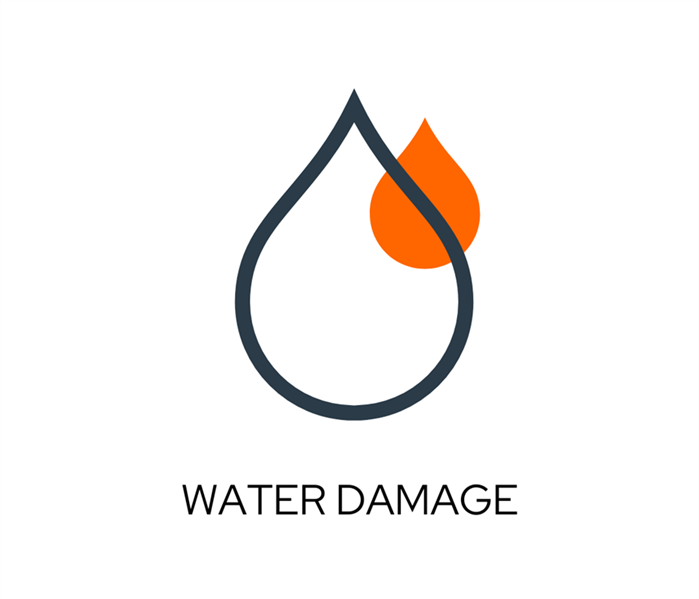 Proudly offering Water Damage Restoration to all of Hall County. Give us a call at 706-536-1010
Proudly offering Water Damage Restoration to all of Hall County. Give us a call at 706-536-1010
Water damage is something that can catch us off guard, and it’s certainly an unwelcome issue. Many times, it is due to human error, such as someone forgetting to turn off a faucet or neglecting to replace a hose with a slight leak. Sometimes, it is due to severe weather or other circumstances out of our control.
When dealing with any type of water damage situation, whether large or small, there are a few steps you can follow that will help you handle the issue:
Do as thorough an assessment as possible of all property that has sustained damages from the event. Look behind appliances, lift up carpeting, check the crawl spaces, and make sure you are using a light source that allows you to see exactly what is going on.
Take pictures of all your findings, no matter how small. Once things dry out, you will have no evidence of what has happened, and that might create a challenge when attempting to recoup losses.
Get in touch with your homeowner’s insurance company and send them all the documentation and images that you have collected. Be clear and precise, describing every instance of damage thoroughly and completely so that all records will be accurate.
Once all the information has been shared with the above entities, make arrangements to allow your property to dry out completely.
Keep us in mind here at SERVPRO of Gainesville for all your water damage needs. We’re experts at handling water damages.
You can visit our website: SERVPRO of Gainesville or call us (706)536-1010
Water Heater Noises
4/1/2022 (Permalink)
Water Heater Noises
You may not give much thought to your Gainesville, GA home’s water heater until it starts to malfunction. One major giveaway is certain sounds it might start to make where it ran quietly in the past. While not all of these sounds are cause for alarm, there are a few that may be pointing to trouble or the need for maintenance.
1. Hammering Sounds
If your water heater makes hammering or banging sounds, this may be startling but is usually not a cause for alarm. This means that someone in the family has turned the water off suddenly, which may cause the pipes to vibrate. When this happens, the pipes may knock against the wall. Wrapping them in heat-resistant soft insulation can fix this problem and prevent long-term damage to the wall.
2. Screaming
This sound can also be startling because it sounds like the entire unit may burst at any moment. However, this usually means a valve somewhere in the unit, the lines or at another connected source may not be closed all the way. If you cannot chase it down, you may want to call in a water damage and restoration company to help you find the source of the faulty valve and inspect any lines for damage.
3. Crackling and Popping
If your water heating unit sounds like it is boiling rocks every time it turns on, this may not be too far from the truth. Over time, sediment can build up at the bottom of the tank and cause crackling or popping as the water forces its way through the buildup during the heating process. A water heater flush can rectify this issue.
Some noises your Gainesville, GA, home’s water heater might make can be alarming. However, when you understand their sources, you can take the steps necessary to resolve or repair the problem before it becomes too serious.
Steps to Prevent a Leaking Toilet
3/1/2022 (Permalink)
Steps To Prevent a Leaking Toilet
It's just a small bathroom leak. You first think someone had a steamy shower or spilled a little something, so you just wipe the floor. Another day, you notice the wetness again coupled with a bad odor. You realize something is very wrong with your porcelain friend, and that is confirmed when you notice the stains on ceiling below the toilet. That slow, sneaky leak has led to some nasty water damage. Learn to prevent this from happening again with 4 easy steps.
1. Find the leak. Act immediately when you see a leaking toilet. Dry the toilet, floor and supply lines. Start with the water supply and look for drips along the line. A leak at the supply line is often fixed by gently tightening the nut.
- Empty the toilet.Usually, the leak is coming from the tank or base. For these repairs, you need to turn off the watersupply and flush the toilet to empty the tank.
- The tank is leaking.Remove the bolts that hold the tank to the base. Most tank-to-bowl repair kits will have all the parts you need to replace: bolts, rubber washers and a large rubber gasket. The most likely culprit for the tank leak is actually the rubber gasket that fits underneath the tank. Just pull it off and fit the new one snugly into place.
- The toilet is leaking at the base.Most of the time, a leaking toilet is in this category, which means you probably have a bad wax seal. It's a common problem, especially if you've noticed the toilet rocking a bit. To replace the wax, lift the toilet and remove the old wax. Inspect the closet flange for cracks and make sure it is tightly secured to the floor. Make any needed flange repairs and replace the wax ring. Taller wax rings available now that may help if the flange is sitting at or below the floor line.
Now you are capable to prevent future water damage from a leaking toilet. "Black water" damage definitely requires some special procedures for cleaning; fortunately, SERVPRO of Gainesville, GA professionals are available to restore the damaged area.
Types of damage a toilet overflow can cause
2/3/2022 (Permalink)
A flooded toilet can cause damage on one or more floors of a home in Gainesville, GA. You should immediately contact a plumber upon noticing signs of a blocked drain line and take measures to limit sewer damage. Here are some of the types of damage a toilet overflow can cause.
Contaminated Water
Water from a toilet overflow is almost always contaminated. Restoration professionals categorize water damage into three categories:
- Category One clean water, originating from supply lines
- Category Two contaminated water, from showers or appliances
- Category Three contaminated water containing solid waste
Water from a flooded toilet is likely either Category Two gray water or Category Three black water. Either category of sewer damage calls for disinfection in addition to cleaning and drying.
Damaged Building Materials
Contaminated water can permeate porous materials such as carpet or drywall. These materials cannot be completely disinfected, and may pose a continued risk of microbial growth. For this reason, mitigation experts recommend tearing out these materials prior to disinfecting and drying the area. Carpet, drywall, or damaged ceilings on a lower floor can be replaced during the restoration process.
Secondary Damage Risks
If damage is not cleaned up quickly or disinfected, there may be an increased risk of several types of secondary damage. Here are a few of the most common forms of additional damage:
• Bacteria
• Staining
• Mold
Immediate mitigation and timely cleanup can limit the extent of primary and secondary damage. Try to keep water from spreading until a plumber arrives to clear the drain line blockage.
If you are not sure how to handle sewer damage, rely on a sewage company in Gainesville, GA. Although homeowners’ insurance probably will not cover the drain blockage, the damage that results should be covered. This may not be the case if the issue is due to a backup in an outside sewer or drain.
Clogged toilet
12/1/2021 (Permalink)
Dealing with an overflowing toilet in your home is frustrating, especially if the situation seems to frequently occur. Along with the mess it leaves behind, a flooded toilet can quickly lead to water damage in other areas of the home. As well as potentially being a costly endeavor, repair is made worse by the fact that the toilet could be a sign of a bigger sewer damage issue.
Toilet Problems
In most situations, there are three main reasons for a toilet overflowing:
Clogged Lines: This is the most frequent culprit, and a plunger often can fix the issues. In some cases, the clog may be too far down the line, a situation which may require calling a plumber. Frequent clogs may indicate it is time for a new toilet as well as serve as a reminder to only flush waste and toilet paper.
Blocked Vents: Plumbing fixtures store air and release it when flushing. Debris in vents can quickly lead to clogs that make toilets begin to drain more slowly or stop altogether.
Sewer Issues: The plumbing in your home is connected to the outside world. If the main line to the sewer is clogged or broken, it can cause sewage backup. Along with toilet issues, there may be leaks in the basement or around other drains.
Professional Cleanup
When the culprit is sewer damage, it means that the overflowing water is contaminated and should be handled by a sewage company. Considered black water, it contains potentially harmful pathogens and microorganisms. If the overflowing water had waste in it, it is best to contact a water remediation and restoration expert to handle the problem. Along with having the proper safety gear for the process, they have the know-how to detect additional damage and ensure that the cleanup is done properly. This guarantees your bathroom and affected areas are safe and clean.
While a toilet issue may seem like something that is easy to deal with, checking that there is no sewer damage is imperative before diving into cleanup.
Household appliances and water damage
11/30/2021 (Permalink)
At SERVPRO of Gainesville we have seen our share of water damages caused by everyday household appliances. Hot water heaters, dishwashers, washing machines and refrigerators are all common sources. But there are preventative measures you can take to make your appliances less susceptible to water damage.
Get your hot water heater inspected at least once a year by a certified electrician. Water heater issues occur with malfunctioning temperatures, or bad plumbing connections. With a dishwasher and washing machine, most water damages occur when you use too much detergent or have bad fixtures. Check your water hoses regularly for cracks or tears and get them repaired if the damage looks problematic.
When it comes to your refrigerator, most water damages occur from freezer and ice maker issues. If the drain at the bottom of the freezer clogs or becomes frozen, water accumulates and can cause a problem. If you notice an unusually large amount of ice, chances are you will need to thaw out your freezer and clean the drain.
Regular maintenance on these household appliances can save you time and money by preventing a water damage from happening in your home. If you experience a water damage due to a faulty appliance, call SERVPRO of Gainesville at 770-536-1010. We guarantee to help make your water damage feel “Like it never even happened.”
How to dry cavities after water damage
10/20/2021 (Permalink)
How does water get into wall cavities?
Wall cavities can be particularly susceptible to long-term damage in your Gainesville home. Once water enters an enclosure like a wall cavity, it can take a long time to dry or lead to secondary injuries like mold growth. These issues can occur through plumbing issues or structural issues. Sometimes humid outdoor air can condensate within cavities leading to a water damage issue. These issues are typically identifiable by discoloration in paint or visible signs of cracking on interior walls. SERVPRO applied structural drying (ASD) technicians can help to remedy wall cavity issues in your home.
What equipment is useful for dealing with cavity damages?
General construction equipment to gain access to the cavity.
Adapted air-moving equipment to dry out a cavity.
Specialist systems like injectidry equipment.
Is it possible to ventilate a wall cavity?
Many different equipment types can help cavity water damage restoration in your Gainesville home. Drying and ventilating equipment usually feature vents attached to air-movers or flex-hoses that are attached to a blower. This equipment is generally applied by drilling discrete holes beneath the baseboard of a wall. From here, the equipment can circulate dry air into the cavity to dry it effectively. SERVPRO technicians can use multiple air-movement equipment to tackle cavity damages in your home.
What are the critical aspects of using air-movers?
Ensure that the vents for air-movers are clear without any blockages to prevent overheating and equipment damage.
Control electrical hazards by using Ground Flow Circuit Interrupters (GFCI), which can prevent hydro electric malfunction.
Check air-mover motors are thermally protected with three-prong plugs before using.
Restoring wall cavities can be a time-consuming task without specialized equipment. Contact SERVPRO of Gainesville at 770-536-1010.
How to clean up after sewer damage
10/1/2021 (Permalink)
Water damage in the home is bad enough. Sewer damage is an even bigger problem. Not only can the water ruin your belongings, but it can leave behind an unbearable odor. Also, sewer water can be lethal. Only professionals should handle sewer cleanup, but there are some important points you should know about to make this process successful.
Your Initial Responsibilities
As soon as you notice a sewer backup or other sewage problems in your home, you should contact your city's utility company immediately. If you notice black water, get family members out of the home immediately, and do the following:
- Turn off the electricity to your home.
- Remove valuables from harm's way if you can do so without touching the water.
- Call a professional sewer cleanup company.
Safety First
A sewer cleanup is an emergency that you shouldn't take lightly. Within sewer water are contaminants including human waste. This water can be dangerous if you come in contact with it. If ingested, the water can be lethal. Do not let anyone in your household, including pets, get near the water.
What the Pros Will Do
Professional crews in Gainesville, GA, have the experience and skill to safely clean up your home and free it from sewage problems. Technicians have the right equipment to get into the water to remove it from your home. The company will thoroughly dry the area and sanitize it. This will keep mold from growing and spreading. The team can also deodorize your home to get rid of the unpleasant smell.
Never try sewer cleanup by yourself. This critical job is best left for knowledgeable experts. If you follow these guidelines, you can stay safe and get your home back into once piece as soon as possible.
Water damage during construction
9/30/2021 (Permalink)
Avoid Water Damage In The Middle Of Construction
Construction can be a long and expensive undertaking. The last thing anyone wants during construction is water damage from a broken pipe or the need for a water pipe repair in the middle of a building project. A flooded worksite leads to delays, hassle, more expense and probably extra paperwork. It is therefore important to take steps to prevent incidents that may result in water damage in the first place. Here are three important precautions that can help you avoid water damage in the middle of construction.
- Create a Waterproofing Checklist Before Construction
Before the building has started, it may help to create a checklist of possible water hazards like unguarded openings where rain may leak through and enact preventative measures. This may include creating temporary roofs and coverings for open stairwells or elevators. - Inspect the Site Before Leaving
One action that can save you a lot of trouble after the exterior has been constructed and work has moved to the interior is performing a detailed inspection of the site and making sure everything is shut down before leaving. This may include:
Making sure doors, hatches and windows are closed
Making sure water is not running in bathrooms
Making sure pump discharge hoses are connected
3. Have the On-Site Manager Check the Pipe System
A third precaution you can take is having a manager sign off on the pipe system before trying to use it. Running water through a pipe system with bad connections or other problems lead to having to shell out for both water pipe repair and a professional cleanup and restoration service in Gainesville, GA. Having water spouting out can also ruin exposed supplies, walls and flooring. So it is best to have the pipe system checked out by the on-site manager and verified as correctly put together before running water through it.
Having your construction site unexpectedly flooded can cause no end of trouble and bring work to a grinding halt. It is therefore best to prevent water damage before ever needing water pipe repair or restoration services.
Use a trusted water restoration company
9/28/2021 (Permalink)
SERVPRO Technicians Are Highly Trusted Professionals Who Provide Timely Water Removal and Restoration for Gainesville and Hall County Homes.
When your Hall County home is unexpectedly invaded by water, it's hard to know who you can trust to respond quickly and professionally. SERVPRO uniformed professionals are highly trusted and extensively trained in water removal, cleanup, and damage mitigation.
How to Help Prevent Costly Water Damage Repairs
Not all water damage repairs in Hall County are caused by unexpected major events like flooding. Harm can be the result of a leaky roof, an old pipe, a broken water heater, or other issues. These problems can require expensive property repairs without appropriate water damage mitigation. These are the signs that you may look out for to protect your home:
- Moldy or musty smells in your property
- Dark spots on your ceiling or walls
- The sound of dripping or running water
- A sudden increase in your water bills
- Puddles that return after you have mopped them up
- Rust on metal surfaces
SERVPRO trained technicians in Gainesville have expert water removal training and techniques. Many of our professionals are certified by the IICRC (Institute of Inspection, Cleaning and Restoration Certification.) They utilize advanced water detection, removal, and drying equipment to help mitigate water damage and prevent further costly repairs.
What to Look for in a Water Removal and Damage Mitigation Specialist
How do you know you can trust the water removal company you engage to handle your water damage problems?
- Water removal and damage mitigation specialists should have extensive training and continuing education.
- They should understand and use IICRC best practices.
- Specialists should be available 24 hours for emergency services.
- Water removal and mitigation professionals must provide timely and effective services.
SERVPRO professionals match all of these qualifications. If you find water damage in your home, act before it becomes an expensive repair. Call SERVPRO of Gainesville (770) 536-1010.
5 Steps if you have a kitchen sink leak
9/28/2021 (Permalink)
Dealing with a leak under your kitchen sink can be a huge hassle, and it is important to handle the problem as soon as you discover it. A leak in your kitchen can lead to flooding and water damage, and knowing what to do when you spot one can help you prevent unnecessary damage and repair costs in Gainesville, Georgia.
Here Are 5 Steps To Follow If You Find a Kitchen Sink Leak
- Shut Off the Water
If you have identified a leak under your sink, turn off the main water valve immediately to stop the leak and prevent any additional flooding from the pipes.
2. Remove Excess Water
It is important to remove any excess water in your home to prevent water damage and mold. You can remove water by mopping or blotting with a towel, but do not use a vacuum cleaner. Calling a professional cleanup service is recommended for major leaks.
3. Remove Valuables
Move any valuable items and non-waterproof belongings from your floor and transfer them to a safe place to avoid additional damage. Keep electronics turned off and remove them if they are at risk of coming into contact with any water.
4. Call Your Insurance Provider
Find out what your insurance policy will cover before you begin your kitchen repair. Homeowners' policies often cover losses from frozen or broken pipes, including the cost to repair the pipes and any personal belongings that are water-damaged beyond repair.
5. Call a Professional
A professional water cleanup and restoration services company will ensure that your kitchen leak is fixed quickly and properly. They have professional equipment to dry and dehumidify your home, clean and sanitize your space, and restore your kitchen to its pre-damaged condition.
A leak under your kitchen sink can be a huge headache to deal with, and taking swift action is crucial to minimizing water damage and excess flooding. Shutting off the water, removing your valuables, and enlisting the help of professionals will ensure that you return your home to good operating condition as quickly as possible
When Water Damage Strikes
6/17/2021 (Permalink)
The first 24 hours following a water loss are the most important in preventing secondary or permanent damage. Within four hours of receiving a loss notification, SERVPRO of Gainesville will be on site to help ensure a water damage is handled by completing the following steps.
Inspection
SERVPRO professionals will inspect affected areas to determine the extent of water damage and will review the inspection with you to answer any questions before beginning the work.
Emergency Services
Our SERVPRO professionals will take steps to help protect your home or business, as well as personal property and other contents, from further damage by extracting the excess water and preparing the area for drying. They will explain the needed emergency services to you step-by-step.
Monitoring
To help ensure your home or business and belongings are dried to appropriate industry standards, one of our SERVPRO professionals will monitor the drying process. The updates will be consistently communicated with you. We will certify to you and your insurance carrier that your structure is dry to preloss conditions to prevent secondary damage to your home or place of business.
Water Mitigation Process
3/9/2021 (Permalink)
Every situation is different and may require a unique solution. However, the general process is always the same!
Step 1: Emergency Contact
We are always available for you in the event of a water emergency. When you call in, no matter the day or time someone will return your call. The main goal during the initial contact is to understand what is going on so we can dispatch someone to your home or business as soon as possible.
Step 2: Inspection and Assess Damage
When we arrive on site our goal is to know what caused the damage if it is not apparent. This way we can have the issue addressed. The damage may require a third party to be involved (ie. plumber). Once we know what has caused the damage we can continue move on to the next step!
Step 3: Water Removal/ Water Extraction
A licensed technician will use specialized water extraction equipment to remove water from your home. Removal and extraction may result in removal of flooring depending on the type of water damage (ie. sewage back up). Our technicians will document and remove items that cannot be restored.
Step 4: Drying and Dehumidification
We will place machines in your home or business to ensure the space is dry and prevent the possible growth of mold. The average run time for drying machines is between 3-5 days. Of course, it may be more or less depending on the extent of the water damage to your property. It is important that you not unplug or move the equipment from where they were placed by the technician to ensure the space dries properly.
Step 5: Cleaning
Our technicians will clean the affected area and neighboring areas with anti-microbial cleaning products to prevent the possible growth of mold. We ensure we clean every crack and crevice!
Understanding the Different Types of Water Damage
2/26/2021 (Permalink)
Water damage can wreck havoc on your Hall County home or business. That being said, not every flood is the same. Flood water is categorized by the types of contaminants present. Understanding the differences among the different types of contaminated water can help you remediate the damage more effectively.
- Clean Water Floods
As their name implies, Category 1, or clean water floods, are categorized by an absence of contaminants. As the least dangerous types of floods, they typically originate from a supply line burst, a shower leak or some other type of clean water source. Just because these floods aren't as dangerous doesn't mean that they shouldn't still be taken seriously. A clean water flood can transform into a Category 2 flood if left untreated for too long. - Gray Water Floods
Gray water floods are also known as Category 2 floods. This flood contains mildly contaminated water, but nothing that could pose a biohazard risk. These floods are often caused when household appliances malfunction and flood, such as dishwashers and laundry machines. If left untreated for longer than 48 hours, a Category 2 flood will quickly become a dangerous Category 3 flood. - Black Water Floods
Category 3 floods, or black water floods, are the most dangerous of all. They are categorized by the presence of biohazards, such as human or animal fecal matter, raw sewage and dangerous chemicals or pesticides. You should never attempt to resolve a Category 3 flood by yourself, due to the possible health risks. Instead, you should contact water damage professionals as soon as you can. These floods are usually caused by toilet overflow, sewage back flow or a a flooding riverbank.
All types of floods are capable of inflicting serious amounts of damage. That being said, it's still important for you to learn the differences between the various types of contaminated water make sure to contact flood remediation experts for assistance, no matter which type of flood you're currently dealing with.
My home has flooded! What now?
1/19/2021 (Permalink)
When your home is flooding, it’s imperative that you first stop the water. Water damage will only continue to get worse as long as the water or excessive moisture is in the area, so the cleanup process should begin as soon as possible. Start by:
- Being Safe
A flooded house presents many dangers that need to be addressed before going into the affected area. If you can safely reach the breaker box, shut off the main circuit breaker. If appliances, electronics, or exposed wires are sitting in or near the water, an electrical current is traveling through the water. It can also contain dangerous contaminants such as sewage, chemicals, and debris. Wear proper safety gear to protect yourself as you go through the house, such as a mask, gloves, safety goggles, and rubber boots. - Contacting the Insurance Company and Documenting Damage
Call your insurance company so that the restoration process can begin as soon as possible. The insurance adjuster will have to assess the damage before any work is done. Before the adjuster arrives, take pictures of all the damage that you can safely access. It’s also good to have photos of your property before the damage occurs. - Eliminating Water
Your insurance company will probably let you start the cleanup process before the adjuster arrives as long as you’ve documented the flooding well with photos. Begin by removing all standing water. A wet/dry vacuum is ideal for this job since it’s safe and removes water and small debris quickly. - Separating Unsalvageable from Salvageable
Determine what’s unsalvageable and discard it. Many porous items such as carpet, drywall, and some upholstered furniture probably won’t be salvageable. - Drying
Open windows and doors to ventilate the area. Running fans and dehumidifiers and HVAC and/or portable heaters will help to dry the area.
If your house has experienced water damage from any type of flooding in Gainesville, GA, you can count on flood damage experts. They’ll return your home to its preloss condition as quickly as possible.
Water Damage: Your Quick Reference Guide
12/4/2020 (Permalink)
Water damage in Gainesville is a serious property issue that homeowners should be fully aware of. By getting basic information about water damage and how to quickly eliminate it, you can help ensure that your residential property remains in excellent condition. To attain this basic information, refer to the quick reference guide found below:
Where Does Water Damage Come From?
Water damage is a hazard that can result from many sources. First, water damage can arise as a result of natural disasters like hurricanes, floods, tornadoes, fires, etc. Additionally, water damage can result from unattended roof leaks, broken water lines, and sewer backups. Additionally, water damage can result from flooding that generates rising waters which put your property underwater for several hours. In the event that the water contains any sewage, you and your loved ones will be exposed to several health hazards.
Structural and Property Damages
One of the property challenges that results from water damage is structural issues. When your ceilings, walls, and floors are exposed to water, the structure of your property can become weak. Additionally, water has the ability to damage several of the structural elements on your property. These damages can cost you thousands of dollars in repairs.
Mold Growth
According to the Environmental Protection Agency (EPA), cleaning and drying your property within 24 to 48 hours of water damage is necessary for the prevention of mold growth. However, it's important to know that while you can start these processes to help eliminate or prevent mold, the fungus can grow in places you can't see. Some of these places include along ceilings and baseboards, underneath wallpaper, and behind the drywall.
Let SERVPRO Assist You Now!
If you find that your residential property has been exposed to water damage, time is of the essence. By contacting a trained team of water remediation specialists immediately, you can salvage goods, protect the structural integrity of your property, and preclude your loved ones from exposure to mold. The company to call for effective, expedient remediation services is SERVPRO. We have over 1700 franchises and more than 50 years of experience in this dynamic sector. Our IICRC-certified technicians work with unprecedented dedication and diligence to get your property back in incredible condition, so contact us immediately to get the detailed care you need and deserve!
Locally Owned Company with National Resources
As a locally owned and operated business, SERVPRO of Gainesville is strategically located to respond quickly to your flood and water emergency event. When water damage occurs in Gainesville, Georgia, we have the resources and personnel to help. Call us today! (770) 536-1010
Who do I call first?
11/19/2020 (Permalink)
We've written blogs in the past, but it never hurts to have a reminder! We want to remind you that we're the number to call when your home or business is affected by flooding from storm damage.
Go ahead and add us to your contact list as "SERVPRO of Gainesville." You can reach us at (770) 536-1010.
Now... what do you do when your home has been affected?
First, you'll call your insurance agent.
Second, be careful entering your home. Water damage can damage the structure of your home (sometimes beyond what the eyes can see) and we want to make sure that you are safe.
Third, document everything. Take photos on your cell phone of everything that is going on.
Fourth, don't use any appliances in the affected areas. It helps to keep power turned off to those areas of your home until an inspection can be done to ensure it is safe first.
Last but not least, give us a call and we'll be there to help!
SERVPRO of Gainesville is locally owned and operated, so we’re already close by and ready to respond immediately when you need us. We make disaster "Like it never even happened." Give us a call today at (770) 536-1010!
Water damage can potentially leave noticeable odors
11/12/2020 (Permalink)
Do you know when to be worried about a funny smell? Most new homeowners are not water damage specialists, but the human nose is an excellent tool for sniffing out trouble. Your nose is not the only way to spot water damage in your new home. SERVPRO technicians are IICRC certified and can help handle any moisture problems you may discover after moving in.
The sooner you notice a problem, the sooner you can call us to help mitigate ongoing damages. When you notice a problem, a highly trained SERVPRO professional can assess the extent of your damages. We can use our specialized equipment to remedy the issue fast.
What should you keep an eye out for when you are looking for possible water damage? Start at the top. When looking for roof damages, obvious water stains aren't the only problem. Swollen insulation is usually an indication of water retention. Check your flashing (where the roof meets the walls) for cracks and look for missing shingles as well as more obvious signs like holes. Look at door frames and molding. Unusual stains or dark spots on the walls can mean trouble.
Inside, make sure you check your appliances after you move in to be certain they are not leaking where you cannot see easily behind them. Cracked hoses and loose connections can be tricky. Ripples, buckling, and changes in texture can tell you the flooring has a water problem. Remember to trust your nose. If it smells wrong, it probably is.
Outside water damages and mold are often caused by improper drainage. Check your spouts to see that they are clear and make sure you do not have water pooling around the foundation of your new home. At the first sign of damage, you can call SERVPRO.
Reach out to SERVPRO of Gainesville and give us a call at (770) 536-1010
The Water You Don't See
9/11/2020 (Permalink)
Even small water damages have the potential to cause serious structural and indoor air quality issues over time.
The key to avoiding costly future restoration is to handle every water problem as a real threat to your property. SERVPRO of Gainesville Professionals have the equipment, training and experience to find and dry unseen water before secondary damages occur. The proper equipment makes a measurable difference in reducing the damage expense during a fire or water loss. When time matters, technology and equipment must be counted on to perform. SERVPRO of Gainesville will answer your call with rapid action and a full arsenal of drying equipment. Here are a few of the tools used by SERVPRO of Gainesville Professionals.
- Moisture Sensors are used to detect moisture in carpets, baseboards and walls.
- Moisture Meters are used to determine the actual moisture content of various materials. The moisture tester provides accurate readings, allowing SERVPRO of Gainesville Professionals to monitor the drying process.
- Thermohygrometers measure temperature and relative humidity. When armed with this information, SERVPRO Professionals can calculate and create an environment most conducive to drying. When facing a contaminated water loss, it is not only important to dry the structure, but the structure must also be disinfected and often deodorized.
- Ultra-Low-Volume (ULV) Foggers will atomize liquid deodorizing agents, producing a fine mist that can easily penetrate the site where odor-causing residues may accumulate. This device can also be used to inject fungicides and disinfectants into wall cavities and other hard-to-reach areas.
- Thermal Foggers dispense solvent-based products by creating a dense fog. The fog consists of tiny particles of deodorant solution that attach to and neutralize odor-causing particles.
The bottom line? SERVPRO of Gainesville Professionals have the training and equipment to help make it "Like it never even happened." Call us at (770) 536-1010
Common Causes for Water Damage
8/14/2020 (Permalink)
Pressurized water supply lines are one of the leading reasons that a home may suffer a flood. Take time to inspect your supply lines and replace them if they appear cracked or show signs of deterioration. You could be saving yourself time and money, and your home from damage.
You can help prevent a flooding disaster by checking these key areas: refrigerator lines, washing machine hoses, and toilet water supply lines. These supply lines usually are easily accessible and can be changed with pliers or an adjustable wrench. If you don't feel comfortable doing this yourself, or if you need assistance, a family member or local handyman could help you.
Let's focus on the toilet in your bathroom as a potential cause for water damage. Here are some of the most common reasons you may experience loss from a faulty toilet:
1-Leaking supply line is the line that connects the plumbing coming out of the floor to the toilet tank. This line is under continuous pressure, which means that if the hose begins to leak, it will continue to leak until the water line is turned off.
2-Old worn-out mechanical parts inside the tank can cause the toilet to run continuously and even overflow onto the floor, resulting in severe water damage to the floor, walls, and everything beneath.
3-The old worn-out wax ring that is at the base of the toilet where it connects to the floor. This wax ring can deteriorate out over time, causing water to leak at the base of the toilet.
4-Tank-to base washer is worn-out or pinched. If the tank is not seated correctly to the base, the washer could fail. Or, if the washer has aged too much, water can leak when flowing down to the bowl.
The water supply lines in a typical home or business are under and have continuous pressure, and if there's a leak or break, water will run out until it's shut off or fixed at the main water shut-off. Leaks inside walls are notorious for causing a lot of damage. These leaks are often unseen, slow, and gradual, so damage builds up and compounds itself over a period of time. To no fault of their own, homeowners don't see the problem until it's too late, and much damage has occurred.
We are water damage restoration specialist and are ready to restore your Hall County home or business to pre-water damage conditions. We quickly extract the water and then dry your property using state-of-the-art equipment. SERVPRO of Gainesville uses moisture monitoring equipment to effectively measure and document the drying process to ensure your property is dry.
Call us 24/7 for emergency water extraction and dry out your property and make it "Like it never even happened."
24 Hour Emergency Water Damage Service
7/21/2020 (Permalink)
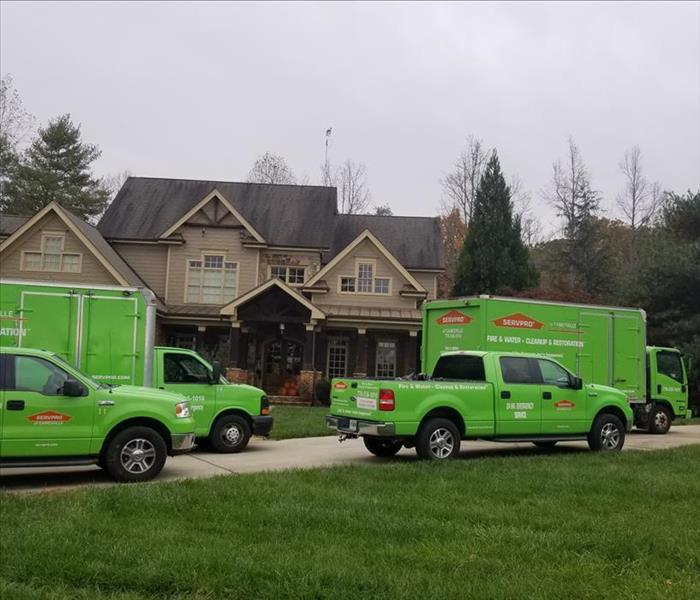 We're available 24 hours a day 365 days a year if you have water damage in your Hall County home.
We're available 24 hours a day 365 days a year if you have water damage in your Hall County home.
Hall County 24 Hour Emergency Water Damage Service
SERVPRO of Gainesville is available 24 hours a day for water emergencies, large or small. When you are dealing with water damage, immediate action is crucial. A delay of just a few hours can greatly increase the severity of the water damage.
We Answer the Phone Ready to Help
Call Today - (770) 536-1010
We understand that when you call us, you may be feeling confused, stressed, and vulnerable. You need an expert to guide you through this crisis. SERVPRO of Gainesville has the specific water damage training and experience to help you through this tough time. We specialize in water damage restoration—in fact, it's the cornerstone of our business.
What to Expect
When you call, we will ask several questions regarding your water damage emergency. These questions will help us determine what equipment and resources to bring, including how many trained SERVPRO Professionals may be needed.
Our SERVPRO Representative will ask several questions:
- Your name and contact information
- Your insurance information (if applicable)
- The street address of the water-damaged home or business
- When did the flooding or water damage occur?
- What caused the water damage (if known)?
- Is there electricity available (on-site)?
About SERVPRO of Gainesville
SERVPRO of Gainesville specializes in the cleanup and restoration of residential and commercial property after a fire, smoke or water damage event. Our staff is highly trained in property damage restoration. From initial and ongoing training at SERVPRO’s corporate training facility to regular IICRC-industry certification, rest assured our staff is equipped with the knowledge to restore your property.
When Your Basement Floods
6/29/2020 (Permalink)
Gainesville, Georgia Residents: We Specialize in Flooded Basement Cleanup and Restoration!
A basement can flood at any time, although flooding most often occurs during heavy rainfall. Basements are inherently prone to flooding because they are the lowest level of a building and are normally built partly or entirely below ground level. There are several reasons why your basement could flood, including:
- A blocked or failed sewer lateral pipe
- Heavy rain causes surface water to pool around your home
- Storm sewer backup
- Sanitary sewer backup
- Foundation drainage failure
- Water supply-line break or hot-water tank failure
- And many more
Have Questions about Basement Flooding?
Call Today 770-536-1010
If flood water is not handled quickly and properly, it can jeopardize your health and safety, and cause severe damage to your home’s structure. Remember, the longer you wait, the worse the problem will get.
The bottom line: a flooded basement can jeopardize your health, safety, and your home’s integrity. It’s worth making a call to SERVPRO of Gainesville, Georgia and let our trained, professional crews handle the situation safely and correctly. We have earned the trust of hundreds of homeowners, business owners, and property professionals.
We are Flooded Basement Specialists:
- We are available 24 hours/7 days per week
- We’re a preferred vendor to many national insurance companies
- We bill the insurance directly – one less thing for you to worry about
- Our technicians are highly-trained in water restoration techniques
- We use s500 IICRC restoration standards
- Advanced inspection and extraction equipment
Basement Flooded? Call SERVPRO of Gainesville 770-536-1010.
AC Leaks - How to Prevent
5/6/2020 (Permalink)
In the south our A/C systems are often working overtime to keep us cool. Occasionally your A/C system will have a leak and depending on the location of your air handler this can result in water damage to your home. Water leakage from a central air conditioner is almost always related to the condensate drip pan and drain system, located at the indoor air handler inside the house. Since the A/C evaporator coil inside the air handler can generate over 20 gallons of condensation on a humid day, the potential for substantial water damage in the event of a malfunction is clear. How can you avoid A/C water leaks?
Check the condensate drip pan regularly – This large flat pan located underneath the indoor air handler catches condensate as it drips off the A/C evaporator coil. Collected condensate drains out of the pan into a drain line usually plumbed into the household sewer line or discharges somewhere outside the house. If it’s cooling season and the air conditioner is running, the drain pan will likely be wet. However, you should not notice standing water in the pan. This usually indicates a clogged or sluggish condensate drain line and an impending damaging overflow. Also, look around the perimeter of the pan for signs of leakage such as wet spots or puddles. Drip pans may crack or corrode with age, seeping small amounts of water gradually. Contact a qualified HVAC service provider if you see standing water or evidence of leakage.
Consider an automatic shut-off switch – To avoid water damage from the condensate system, an automatic shutoff switch detects excess standing water in the drain pan and turns off power to the air conditioner before an overflow occurs.
Get regular A/C service – Mold growth inside the wet drip pan is a frequent cause of clogs in the drain line. Annual preventive maintenance by a qualified HVAC technician includes inspecting the condensate drain system, cleaning the pan and installing time-release biocide tablets in the pan to inhibit mold and algae growth all season long.
If you have water damage from your HVAC system call SERVPRO of Gainesville at 770-536-1010
The Ins and Outs of Basement Flooding
4/8/2020 (Permalink)
If you have a basement in your Hall County home, you probably are well aware of the looming threat of flooding in this infamous room. Sometimes it can't be avoided, so it's in your best interest to arm yourself with knowledge in preparation for this damp event.
Causes
In order to prevent a basement flood before it occurs, or prevent more flooding after an initial incident, you will need to locate the source. There are many ways for water to pool at this lowest point in your house, so you will want to make a thorough inspection. Some usual suspects are:
- Hurricanes or heavy rain
- Poor drainage
- Inadequate sealing
- Pipe or appliance rupture
- Sump pump failure
Professional Solutions
Often, homeowners don't have the time or equipment to deal with flooding thoroughly. In this case, do your best to stop the flooding if it is coming from inside the house, and turn it over to the professionals here at SERVPRO of Gainesville. Try to have a water damage remediation service picked out beforehand so you can be sure they are a company you can trust. In the meantime, remove as much contents as you can to a drying area outside and turn off the electricity in your basement.
Pumping
It is possible to pump out the water yourself, especially if your basement is bare and any pipe repair is already done. You can rent a submersible pump from your local hardware store. You will need to use a generator and extension cord so that the electricity can remain off in the water damaged area. Be sure to point the hose carrying the water out of the basement away from your house, ideally into a storm drain.
Flooding isn't the end of the world if you properly dry it out, or call people who can pump and ventilate for you. If you have a plan, you won't have time to panic while you are efficiently restoring your home. Be the best homeowner you can be!
Water Damage May Be Hiding in Your Home
3/4/2020 (Permalink)
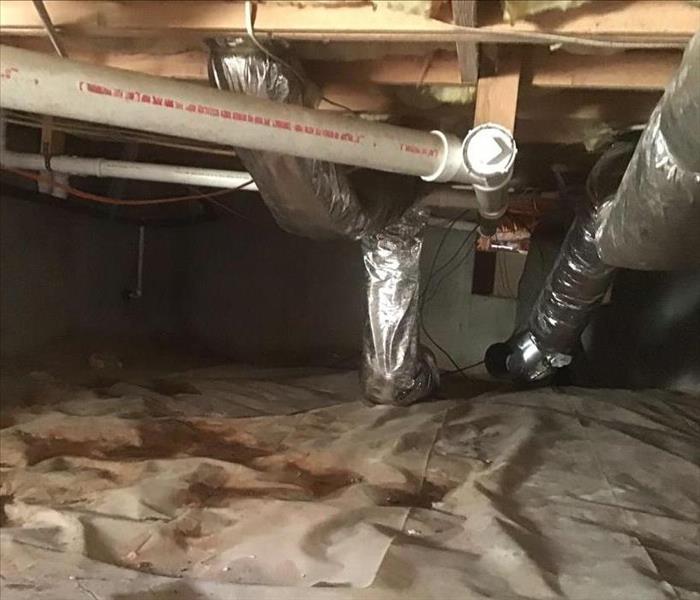 Water can flow through hvac floor vents into your ductwork below your house as it did in this Hall County home.
Water can flow through hvac floor vents into your ductwork below your house as it did in this Hall County home.
Water can be hiding around your house, and you not even know it. Heavy wind-driven rain from a storm, or even just the normal day-to-day activities can lead to water damages. Building materials and water don't mix. Insulation, wood studs, plywood sheathing, and subflooring can all degrade, rot, or develop mold when they're repeatedly saturated with water.
Making the situation even worse, this water damage is often hidden from sight, tucked away between walls or under floors. As a result, significant structural damage can occur before it's discovered. Here are some places around the house that are particularly vulnerable to getting wet and staying wet.
Behind the Drywall After Flooding
Any time flood waters rise above floor level, whether it's from high rains or a burst water supply pipe, all drywall along the lower portion of the wall must be inspected and likely replaced. Even if the water subsides quickly and the wall looks fine, mold can be quickly developing behind the wall. Keep in mind that the electrical wiring may also have been damaged.
Under the Sink
A slow drip from a water line or the drain line beneath a kitchen or bathroom sink will often go unnoticed until a musty smell alerts you that something's not right. Because the area under a sink is dark, it's a prime place for mold to develop when moisture is present. It's a good idea to check regularly under sinks with a flashlight to ensure that a slow drip isn't causing any moisture problems.
Beneath the Dishwasher
Dishwashers are sealed to keep the water inside the tub, but leaks can develop in the joints of the water supply line that runs to the dishwasher or in the drain line beneath. Because you can't see under the dishwasher, over time a slow leak can do severe damage to the subfloor. The damage may not be discovered until you remove the dishwasher to replace it with a new one and realize, to your annoyance, that you'll have to replace a section of the floor as well.
Inside Walls Beneath the Windows
Windows are a prime spot for water leaks. Rain can seep in between the window sash and the jamb and trickle down to the framing studs in the wall without your ever knowing it's happening. Over time, repeated leaks can rot wall studs and other wood framing members, which can lead to expensive repairs.
Under the Siding
Common locations for water leaks in siding are at the corners of the house, anywhere two siding panels meet, and around the windows where the siding meets the trim. Unsealed gaps in these spots allow water to trickle beneath the siding and eventually rot the plywood sheathing that lies beneath. The damage may remain hidden until the siding is replaced.
Exterior Door Threshold
The wood beneath the metal threshold of an exterior door is subject to saturation every time it rains. While treated wood is commonly for this application, even treated wood will eventually swell and become spongy when continually exposed to moisture. Damage may not be noticed until the metal threshold starts to work loose when the wood beneath has begun to rot and can no longer support it.
Exterior Windowsills
This is a common spot for water damage in older homes with windows that have been painted numerous times over the years. Just a tiny trickle of water through cracks in the paint can slowly rot away the wood without your noticing. To check for problems, take a screwdriver and press firmly along a sill. If there's hidden damage, the screwdriver tip will sink into the soft, damaged wood.
Next to the Tub or Shower
Wherever water lines run within walls, there's a chance for leaks to develop. While modern plumbing techniques have reduced the risk, plumbing connections (where pipes attach to other pipes) still have the potential to spring a leak. You won't have a clue that this is happening unless water begins to pool beside a fixture or the floor near it becomes spongy because the subfloor is rotting.
Under a Wobbly Toilet
To help seal the connection, a wax ring fits between the base of a toilet and the toilet flange that connects to the drainpipe beneath. The wax is soft and pliable, which makes it well suited for this job, but also means that it can leak over time. If there's a problem with the wax ring, you may notice a little bit of water around the base of the toilet, but it's more likely that you won't see any water at all—although it will be soaking into the subfloor all the same. In fact, the first indication that you have a problem may be a toilet that starts to wobble because the floor supporting it is rotting away.
Behind a Shower Surround
Unless your bathtub is a single, molded unit, there a good chance the caulk between the tub and the surround will one day fail, allowing water to leak in and damage the wood studs and framing materials. Keep an eye on the condition of the caulk, and if it's starting to discolor or pull away, remove it and replace it with fresh new caulk.
Around a Chimney
Roof penetrations, such as for chimneys, vents, and exhaust fans, extend through the shingles and roof deck. If they aren't properly sealed, water can seep in and damage the roof deck without anyone noticing. Having the roof professionally inspected annually will help pinpoint problems around penetrations so they can be repaired before you're on the hook for a complete roof replacement.
Inside an HVAC Unit
The indoor part of an HVAC unit features a shallow pan that collects condensed water that forms on its evaporator coils when the air conditioning is running. From there, the water is directed to a floor drain via a small line. If this line becomes clogged—unfortunately, not a rare occurrence—the water accumulates in the drip pan or even overflows, creating the perfect environment for mold to develop inside the HVAC unit.
Behind an Exterior Faucet
Exterior faucets are hot spots for hidden leaks because the faucet connects to a water pipe just beneath the siding—a place where it's difficult to make a secure connection. If a leak develops here, the water often runs down the inside of the wall, where it can do major damage to sheathing and framing members before it's discovered.
Behind the Washing Machine
The hot and cold-water hoses from the machine attached to valves already installed in the wall. These couplings are similar to those on garden hoses, and if they're not attached snugly, or if the rubber washer in a coupling fails, they're prone to leaking. Once the washing machine is in place, the valves are typically hidden behind the machine, and a slow leak can saturate the drywall unnoticed, destroying it and allowing mold to develop.
Below a Window Air Conditioner
Air conditioners remove moisture from the air as they cool it. The moisture, or condensation, is then directed through a tube to the outside of the house. As a window air conditioner ages, the tube can become clogged, or come loose entirely, causing the condensation to spill out of the unit and drain into the wall space below, rotting wood studs and sheathing without anyone knowing what's going on.
Tips for finding a leak in your bathroom
2/7/2020 (Permalink)
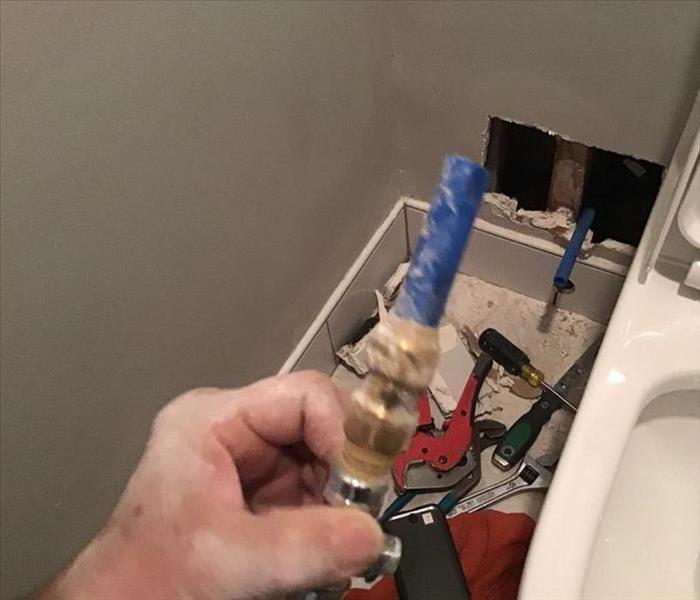 Determining the cause of loss in a bathroom can sometimes be a challenge. When the repairs are complete call SERVPRO of Gainesville.
Determining the cause of loss in a bathroom can sometimes be a challenge. When the repairs are complete call SERVPRO of Gainesville.
A leak in your shower or bathtub can cause water damage, which is why it needs to be addressed as soon as possible. Before the problem can be taken care of, however, you must be able to identify the source of the leak. Here are some tips to help you find a shower or bathtub leak in your Gainesville, Georgia home.
Inspect the Shower/Bathtub
First, you need to determine where exactly the leak is coming from. If you are inspecting a shower, you should start by looking at the shower pan, or the base of the shower. Indications of a shower pan leak include:
- Water seeping through ceiling of room below shower
- Mold near shower pan
- Missing grout around shower pan
- Rotting gaps between wall and floor caused by water damage
These signs of leaking can help you get a better idea of the source of the problem and identify any water damage.
Look for Other Sources
If the leak isn’t coming from your shower pan, look for any other parts of your shower or bathtub where it may have originated. Dripping faucets or showerheads are common sources of a bathtub leak and are relatively easy to fix. When inspecting your bathtub or shower, make sure you are aware of the severity of the issue so that you are prepared to take care of it.
Check for Water Damage
If you’re still struggling to find the leak, keep an eye out for any signs of water damage. Water damage can help give you a clearer idea of where the leak is. If you do come across any signs of damage, make sure to address it while it’s still early in order to mitigate the effects that it can have on your home.
A leak in your bathtub or shower can be frustrating to deal with but keeping the resulting water damage under control can ease the situation. Be sure to talk with a water damage specialist to restore damage from a shower or bathtub leak and help preserve the state of your home.
Common Causes of Water Damage
1/2/2020 (Permalink)
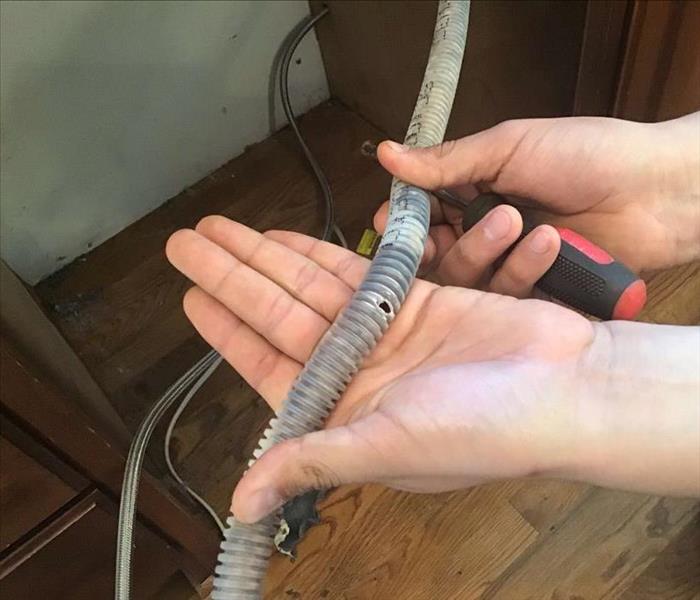 A small hole in a water line can cause extensive water damage in your home.
A small hole in a water line can cause extensive water damage in your home.
Water damage in the home, especially damage that is not identified, can cause serious issues to the home’s structure and even to you and your family’s health. Unfortunately, far too many homeowners are unaware of some of the most common causes of water damage and are therefore not prepared to prevent it in the first place. While some water damage is unavoidable, being educated on typical sources for water issues will make you more prepared to identify a problem and handle it before it becomes both costly and destructive to your home.
Residential water damage is extremely common, especially in homes throughout the Hall County, Gainesville, Georgia area. Understanding potential sources of water issues is the first step to prevention. The following are some of the most common causes of water damage:
- Washing machine supply lines pressure
- Dripping toilet
- Busted or leaking pipes
- Sewer lines backup
- Gutters
- Water buildup in crawl spaces
- HVAC problems
- Malfunctioning appliance like dishwasher, sink, refrigerator, etc.
- Heavy rains or major storms
While the above causes are the most commonly seen challenges for homeowners, there are a variety of additional causes of water damage. Being proactive is the best way to save money and maintain your home’s interior and exterior in optimal condition. If you believe that your home has suffered from water damage, our team of SERVPRO water damage restoration experts is here to help. Call us today to learn more!
Don't Underestimate Water Damage
12/6/2019 (Permalink)
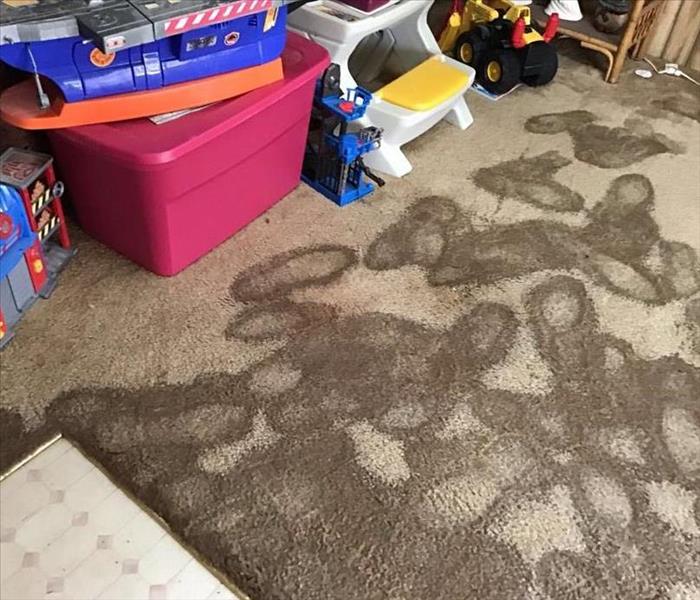 Don't underestimate the amount of damage that can be caused in your home.
Don't underestimate the amount of damage that can be caused in your home.
Don’t underestimate water damage in your Hall County home
The amount of damage water can cause is amazing and often underestimated by homeowners. Excess moisture is bad enough, but when a home is flooded or hit with a plumbing disaster (like a busted pipe), the situation can quickly get out of hand. There’s a reason why these incidents are among the most expensive problems a homeowner can face.
Floods, sewage back flows, and other sources of contaminated fluid usually cause the worst damage. Water can be filled with all kinds of deadly substances, ranging from chemical residues to animal feces to parasites. Bacteria, viruses and fungi grow in an alarming rate in contaminated fluid, and severe health risks can be caused by these contaminants.
This problem is compounded by the composition of most homes, which are filled with organic materials. Drywall, wood and the matter that is trapped in carpet fibers are just a few examples, and they can give pathogens room to grow. Within 48 hours, mold may begin creeping behind the walls and releasing spores, and any organic materials that have been soaked through by contaminated fluid will usually have to be destroyed.
SERVPRO of Gainesville will dry the home quickly and apply antibacterial, antiviral, and anti-fungal agents to all surfaces that had contact with the water. This ensures the family can return to a safe home.
The Science of Drying
11/1/2019 (Permalink)
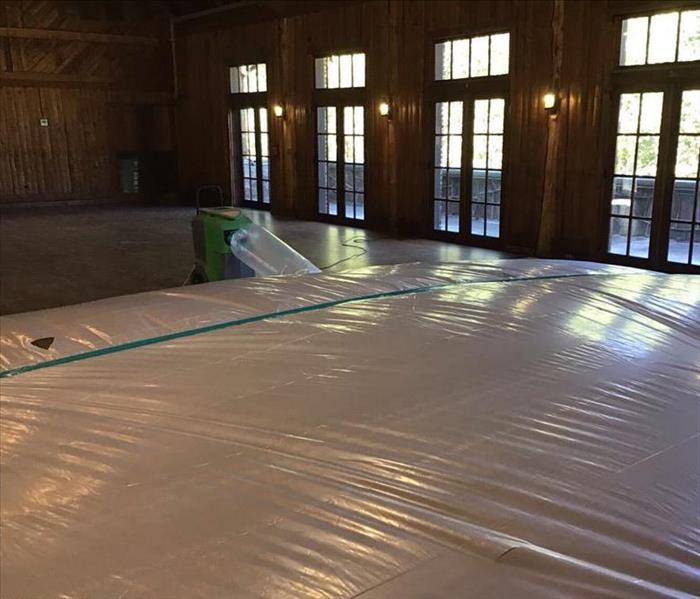 Containment is often used to reduce the size of the drying chamber to focus our drying efforts as it was on this commercial loss.
Containment is often used to reduce the size of the drying chamber to focus our drying efforts as it was on this commercial loss.
Did you know there is a science behind the process of drying? Having this knowledge is essential to restoring a water-damaged structure to its preloss condition. While your initial reaction may be to grab a few towels to mop up the mess and place a fan or two around the damaged area, SERVPRO of Gainesville Professionals are trained in the science of drying and follow strict industry approved standards to help lower the chances of any secondary damage. If your home or business suffers from water damage, our team will:
- Inspect the building to detect every component that is wet to help prevent secondary damage from happening.
- Measure how much moisture is in wet materials and monitor whether the materials are drying properly.
- Speed up Mother Nature by using professional drying equipment.
What exactly does it mean to help “speed up Mother Nature”? A wet building can often dry naturally because the environment always seeks equilibrium. When materials are wet, moisture will naturally move to drier air at the surface of the material–but only if the air is, indeed, drier.
The only problem is, nature often takes too long and secondary damages may occur while the building is drying out.
SERVPRO of Gainesville has the tools and equipment to help Mother Nature along, including equipment to help dry hardwood floors, tough-to-reach spaces inside walls, and much more. Our technicians also use state-of-the-art monitoring equipment and a proven scientific process to help speed the drying of your home or business.
SERVPRO of Gainesville has the training and equipment to help make water damage “Like it never even happened.” If your home or business has water damage, give us a call today at 770-536-1010.
Drying equipment at SERVPRO of Gainesville
10/25/2019 (Permalink)
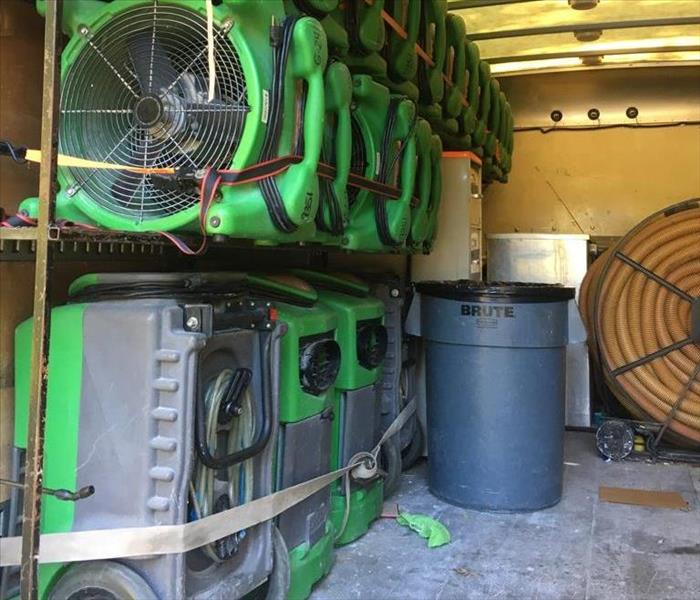 When you have water damage, we have the equipment ready to respond.
When you have water damage, we have the equipment ready to respond.
When water damage has occurred, water can be absorbed into the drywall (sheetrock), baseboards, subflooring, etc. Drying these surfaces requires high-velocity air movers to accelerate the release of absorbed water into the air. Dehumidifiers are necessary for removing this excess moisture to help protect property and create conditions for efficient drying.
TYPES OF AIR MOVERS
There are two types of industrial air movers we use at SERVPRO of Gainesville. Both types vary by direction and speed of airflow:
- Axial: Axial air movers blow large amounts of air in a wide space. These air movers are usually larger and produces a higher airflow. Axial air movers can only move air horizontally, but they are ideal for drying walls and floors, cooling equipment and ventilation.
- Centrifugal: Centrifugal air movers are compact models. They draw air from different sources and direct it all to one spot. You might use a centrifugal air mover in hard-to-reach areas such as closets, cabinets and crawl spaces.
TYPES OF DEHUMIDFIERS
There are two types of industrial dehumidifiers we use at SERVPRO of Gainesville. Both types vary by direction and speed of airflow:
- Refrigeration: Electric refrigeration dehumidifiers are the most common type of dehumidifiers. They work by drawing moist air over a refrigerated evaporator with a fan. The cold evaporator coil of the refrigeration device condenses the water, which is removed, and then the air is reheated by the condenser coil. The now dehumidified, re-warmed air is released into the room. This process works most effectively at higher ambient temperatures with a high dew point, in cold climates, the process is less effective. Highest efficiency is reached above 20 °C (68 °F) and 45% relative humidity.
- Desiccant: This process uses a special humidity-absorbing material called a desiccant, which is exposed to the air to be conditioned. The humidity-saturated material is then moved to a different location, where it is "recharged" to drive off the humidity, typically by heating it. The desiccant can be mounted on a belt or other means of transporting it during a cycle of operation. Because of the lack of compressor parts desiccant dehumidifiers are often lighter and quieter than compressor dehumidifiers. Desiccant dehumidifiers can also operate at lower temperatures than compressor dehumidifiers as the unit lacks coils which are unable to extract moisture from the air at lower temperatures.
If you’ve had water damage at your home or business call SERVPRO of Gainesville 770-536-1010 for emergency service.
Are you ready for cold weather?
10/23/2019 (Permalink)
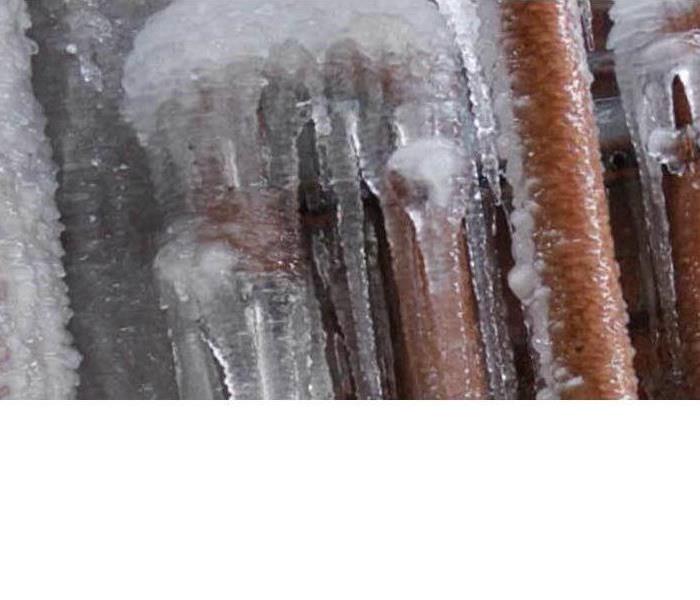 Don't let this happen to you. Prepare your home for cold weather.
Don't let this happen to you. Prepare your home for cold weather.
It’s time to prepare your home for cold weather - winterize your home before the cold sets in:
- The main valve - Know where the main water valve is located and confirm it turns easily. Don't wait until an emergency to find out.
- Pipe insulation - Insulate plumbing in drafty and unheated areas such as garages, outdoors, unfinished basements, and crawlspaces.
- Faucet drip - Leave a trickle of water running on faucets located on exterior walls to prevent pipes from freezing
- Open cabinets - Keep vanity doors under sinks open to allow heat inside.
- Garage door - Keep your garage door closed, when able, to maintain maximum heat.
- Cap bibs - Place insulation caps on hose bibs.
- The thermostat - Leave the thermostat set no lower than 55 degrees F.
Don't Let Water Damage Ruin Your Holiday Travel Plans
10/4/2019 (Permalink)
 Is your home secure while you are traveling for the holidays?
Is your home secure while you are traveling for the holidays?
Traveling to Grandma’s house for the holidays? Make sure your travel plans include keeping your home safe while you are away.
The Thanksgiving, Christmas and New Year’s holidays are quickly approaching. When leaving Gainesville for vacation, few people consider prepping their homes against water damage. You go through your checklist of turning off the coffee pot and stove and locking all the doors, but what happens if you have a leak and need a water pipe repair while you are away? A broken pipe can do a lot of damage, especially if it is left unattended for several days.
Prepping Your Home
Before leaving for an extended vacation, check your home for leaks. Examine the pipes under the sink and the water heater for any cracks or rust. Inspect the hoses that connect to any appliances. Insulate any exposed pipes if you are leaving in the winter. A pipe that burst due to freezing needs water pipe repair immediately. Ask a neighbor, friend or family member if they can check in on your home periodically. If no one can check on your home, turn off the main water and drain the pipes.
Preventing Floods
It is important to not only prep your home to prevent damage from a leak but also from a storm. Make sure your gutters are cleaned and water can flow freely through them. Check your sump pump. Clear out any debris you see. Test it by filling the sump pit and turning on the pump. Check your window seals and your roof for any leaks. All of these checks are especially important if any heavy rains or storms are expected in your area.
Returning from a vacation to find your house flooded can be devastating. Standing water can cause real damage to your home. A simple water pipe repair can escalate into a big problem if no one is there to address the issue. Take the time to prep your home against intruding water before you leave. That way you can enjoy your time away without worries.
If you have water damage call SERVPRO of Gainesville at 770-536-1010.
Clogged Gutters Can Cause Damage To Your Home
10/3/2019 (Permalink)
 Clogged gutters can cause serious damage to the interior and exterior of your home.
Clogged gutters can cause serious damage to the interior and exterior of your home.
Fall is here and as the leaves begin to fall from the trees, we need to be mindful of making sure these leaves don’t become a problem for our houses. As the leaves begin to fall many will end up in the gutters on our roof and if you aren’t careful this could create a problem that could result in costly damages needing repair.
While it’s still dry out, the leaves won’t cause much of a problem. However, as soon as you get your first heavy rainstorm, the problems will start to pop up. If your gutters are filled with leaves, the rain can’t drain out properly. When this happens, your gutters will overflow, and the water could cause water damage to walls, soffits, fascia, siding, basements, and even your foundation.
If water does back up in your gutters, the debris and pooling water can start to eat away at the gutter materials, which can cause holes and leaks. Once you have holes, it might not be a simple fix—you could end up having to replace your gutters entirely.
How often you clean your gutters depends largely on where you live. If you live in an area without any trees around, you can probably get away with cleaning your gutters just once a year, since they aren’t filling up with leaves and other debris as quickly. Of course, if there is a tree close to your house that does lose its leaves, you might have to clean them more often.
Water Removal and Extraction
9/11/2019 (Permalink)
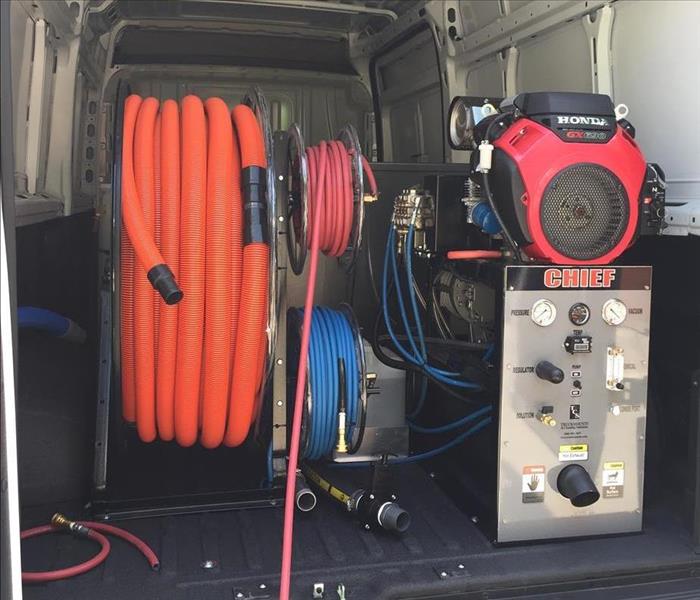 Our new truck mounted extraction unit is ready to be dispatched to customers water losses.
Our new truck mounted extraction unit is ready to be dispatched to customers water losses.
The water extraction step removes the majority of the water from your home or property. By performing a thorough water extraction, SERVPRO Franchise Professionals help reduce the drying time and help to prevent mold and secondary water damage. They use powerful pumps and truck-mounted vacuum units to quickly remove hundreds or thousands of gallons of water from your property.
Emergency Water Removal
Highly trained technicians will begin the water removal process almost immediately. Depending on the amount of water, they may use powerful submersible pumps in addition to industrial strength, wet/dry vacuums. This step helps to reduce drying time and helps to prevent mold and secondary water damage.
- Remove Excess Water
- Use Submersible Pumps and Industrial Wet/Dry Vacuums
Inspect the Carpet Pad and Carpet
SERVPRO Franchise Professionals inspect the carpet and pad and determine if it should be removed to protect the subfloor.
- Inspect Carpet Pad and Remove If Needed
- Inspect Carpet and Remove If Needed
Water Removal Equipment
- Moisture detectors, hygrometers, and other meters measure the extent of moisture saturation.
- Infrared cameras may be used to find “hidden” water behind walls and ceilings.
- Submersible and gas-powered pumps are used for continuous pumping of high-level water.
- Truck-mounted and portable extraction units perform efficient water removal.
Floodplains What Are They and How to Protect Your Property
9/14/2018 (Permalink)
A floodplain is an area of land adjacent to a stream or river which stretches from the banks of its channel to the base of the enclosing valley walls, and which experiences flooding during periods of high discharge. The soils usually consist of levees, silts and sands deposited during floods.
Historically, many towns have been built on floodplains where they are highly susceptible to flooding for a number of reasons
- access to fresh water
- the fertility of floodplain land for farming
- cheap transportation, via rivers and railroads which often followed rivers
- ease of development of flat land
The extent of floodplain inundation depends in part on the flood magnitude. What should you do to reduce the potential amount of damage to your home if you live in a floodplain?
- Elevate and reinforce your home to make damage less likely during a flood.
- Check with a professional to:
- Raise your furnace, water heater, and electric panel to floors that are less likely to be flooded. An undamaged water heater may be your best source of fresh water after a flood.
- Install check valves in plumbing to prevent floodwater from backing up into the drains of your home. (As a last resort, when floods threaten, use large corks or stoppers to plug showers, tubs, or basins.)
- Construct barriers such as levees, berms, and flood walls to stop floodwater from entering the building (if permitted by local building codes).
- Seal walls in basements with waterproofing compounds to avoid seepage through cracks.
- Use sand bags when flooding is expected:
- It takes two people about one hour to fill and place 100 sandbags, creating a wall one foot high and 20 feet long.
- Make sure you have enough sand, burlap or plastic bags, shovels, strong helpers, and time to place them properly.
- If a flood is expected, some communities will offer free sandbags to residents. Be sure to watch or listen to the news so you can access these resources.
Remember: standard homeowners insurance doesn’t cover flooding but flood insurance does. Get information at www.FloodSmart.gov.
Common Causes of Water Damage
9/14/2018 (Permalink)
 This Gainesville customer's bedroom carpet was saturated with water after a pipe burst in their home.
This Gainesville customer's bedroom carpet was saturated with water after a pipe burst in their home.
Water damage in the home, especially damage that is not identified, can cause serious issues to the home’s structure and even to you and your family’s health. Unfortunately, far too many homeowners are unaware of some of the most common causes of water damage and are therefore not prepared to prevent it in the first place. While some water damage is unavoidable, being educated on typical sources for water issues will make you more prepared to identify a problem and handle it before it becomes both costly and destructive to your home.
Residential water damage is extremely common, especially in homes throughout the Hall County, Gainesville, Georgia area. Understanding potential sources of water issues is the first step to prevention. The following are some of the most common causes of water damage:
- Washing machine supply lines pressure
- Dripping toilet
- Busted or leaking pipes
- Sewer lines backup
- Gutters
- Water buildup in crawl spaces
- HVAC problems
- Malfunctioning appliance like dishwasher, sink, refrigerator, etc.
- Heavy rains or major storms
While the above causes are the most commonly seen challenges for homeowners, there are a variety of additional causes of water damage. Being proactive is the best way to save money and maintain your home’s interior and exterior in optimal condition. If you believe that your home has suffered from water damage, our team of SERVPRO water damage restoration experts is here to help. Call us today to learn more!
A/C Leaks - How to Prevent
9/10/2018 (Permalink)
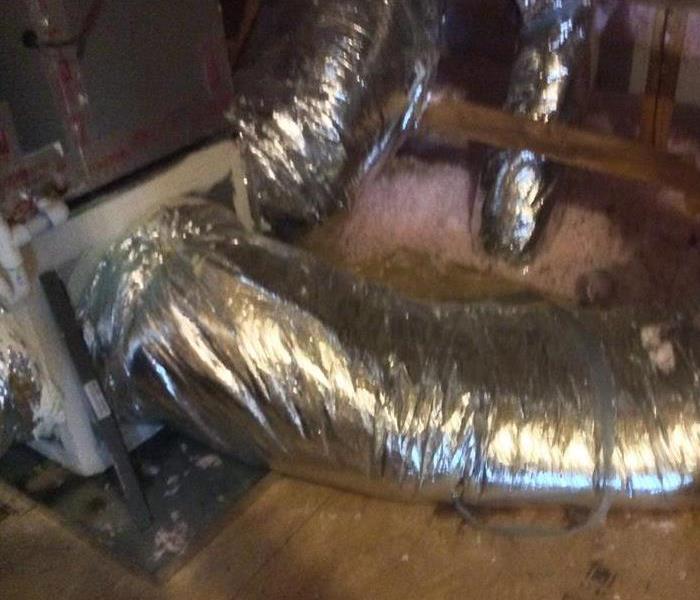 A/C Air Handlers are often located in attics, if the drain line clogs and the wet drip pan overflows this can result in damage to the rooms below.
A/C Air Handlers are often located in attics, if the drain line clogs and the wet drip pan overflows this can result in damage to the rooms below.
In the south our A/C systems are often working overtime to keep us cool. Occasionally your A/C system will have a leak and depending on the location of your air handler this can result in water damage to your home. Water leakage from a central air conditioner is almost always related to the condensate drip pan and drain system, located at the indoor air handler inside the house. Since the A/C evaporator coil inside the air handler can generate over 20 gallons of condensation on a humid day, the potential for substantial water damage in the event of a malfunction is clear. How can you avoid A/C water leaks?
Check the condensate drip pan regularly – This large flat pan located underneath the indoor air handler catches condensate as it drips off the A/C evaporator coil. Collected condensate drains out of the pan into a drain line usually plumbed into the household sewer line or discharges somewhere outside the house. If it’s cooling season and the air conditioner is running, the drain pan will likely be wet. However, you should not notice standing water in the pan. This usually indicates a clogged or sluggish condensate drain line and an impending damaging overflow. Also, look around the perimeter of the pan for signs of leakage such as wet spots or puddles. Drip pans may crack or corrode with age, seeping small amounts of water gradually. Contact a qualified HVAC service provider if you see standing water or evidence of leakage.
Consider an automatic shut-off switch – To avoid water damage from the condensate system, an automatic shutoff switch detects excess standing water in the drain pan and turns off power to the air conditioner before an overflow occurs.
Get regular A/C service – Mold growth inside the wet drip pan is a frequent cause of clogs in the drain line. Annual preventive maintenance by a qualified HVAC technician includes inspecting the condensate drain system, cleaning the pan and installing time-release biocide tablets in the pan to inhibit mold and algae growth all season long.
If you have water damage from your HVAC system call SERVPRO of Gainesville at 770-536-1010
Preparing for Holiday Travel
9/10/2018 (Permalink)
The Thanksgiving, Christmas and New Year’s holidays are quickly approaching. When leaving Gainesville for vacation, few people consider prepping their homes against water damage. You go through your checklist of turning off the coffee pot and stove and locking all the doors, but what happens if you have a leak and need a water pipe repair while you are away? A broken pipe can do a lot of damage, especially if it is left unattended for several days.
Prepping Your Home
Before leaving for an extended vacation, check your home for leaks. Examine the pipes under the sink and the water heater for any cracks or rust. Inspect the hoses that connect to any appliances. Insulate any exposed pipes if you are leaving in the winter. A pipe that burst due to freezing needs water pipe repair immediately. Ask a neighbor, friend or family member if they can check in on your home periodically. If no one can check on your home, turn off the main water and drain the pipes.
Preventing Floods
It is important to not only prep your home to prevent damage from a leak but also from a storm. Make sure your gutters are cleaned and water can flow freely through them. Check your sump pump. Clear out any debris you see. Test it by filling the sump pit and turning on the pump. Check your window seals and your roof for any leaks. All of these checks are especially important if any heavy rains or storms are expected in your area.
Returning from a vacation to find your house flooded can be devastating. Standing water can cause real damage to your home. A simple water pipe repair can escalate into a big problem if no one is there to address the issue. Take the time to prep your home against intruding water before you leave. That way you can enjoy your time away without worries.
If you have water damage call SERVPRO of Gainesville at 770-536-1010.
Document Restoration
9/4/2018 (Permalink)
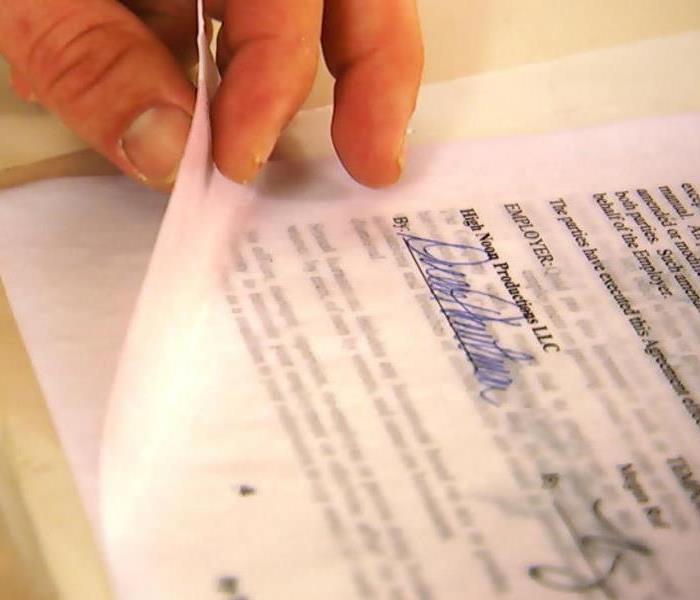 What would you do?
What would you do?
In the aftermath of disaster, some of your most valued contents—documents, photographs, and books—could be lost forever. As a leader in the restoration industry, SERVPRO knows that timely mitigation is the key to recovering damaged possessions. With years of experience and state-of-the-art technology, SERVPRO’s restoration professionals will help you recover your paper goods before it is too late.
Our Document Restoration Facility:
- Innovative: we use the latest vacuum freeze-drying method, as well as gamma irradiation technology for sterilizing
- Secure: managed by HIPPA Master-certified technicians, under 24/7 surveillance
- Digital: we use a computerized inventory system for digitizing your documents
- Flexible capacity - we can accommodate large commercial losses or small residential jobs
- Full Service: we offer a range of services including drying, cleaning/disinfecting, re-jacketing, digitizing, and deodorization
Our Technology
The SERVPRO document restoration team uses innovate vacuum freeze-drying techniques; in fact, we use the same freeze-drying methods used by the Library of Congress to dry valuable historic documents and books. Our vacuum freeze-drying process is the only method approved by the National Archives and Records Administration (NARA) and the General Services Administration (GSA).
Types of content:
- paper documents
- books and magazines
- manuscripts and files
- photographs, films, negatives, and microfiche
- x-rays
- blueprints and maps
- parchment
Document Cleaning and Disinfecting
In many water damage situations, like sewage or flood water, documents will be exposed to bacteria, viruses, pesticides, or other harmful chemicals. Our team uses a gamma irradiation process to safely and effectively sterilize your documents.
Digitizing Services
In the digital age, converting your paper files and photos to digital formats can have an invaluable impact on your business or home. With the help of SERVPRO’s restoration professionals to digitize your documents, you can save storage space and have access to your records at the touch of a button. And perhaps most important of all, you’ll have digital copies of your valuable documents that can’t be lost in a flood or fire.
Need your valuable documents restored? Call SERVPRO of Gainesville 770-536-1010
Hall County 24 Hour Emergency Water Damage Service
8/13/2018 (Permalink)
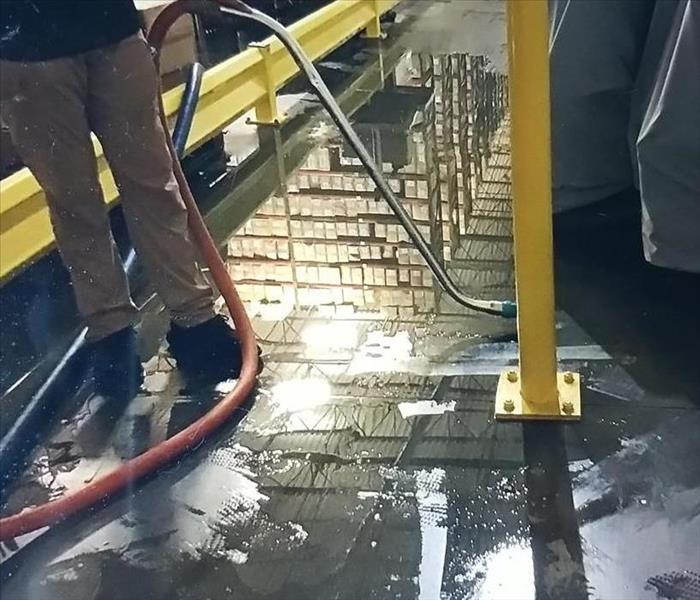 Commercial water loss
Commercial water loss
SERVPRO of Gainesville provides 24 hour fire and water damage restoration service in Gainesville, Georgia and Hall County.
SERVPRO of Gainesville is available 24 hours a day for water emergencies, large or small. When you are dealing with water damage, immediate action is crucial. A delay of just a few hours can greatly increase the severity of the water damage.
We Answer the Phone Ready to Help
Call Today – Gainesville 770-536-1010
We understand that when you call us, you may be feeling confused, stressed, and vulnerable. You need an expert to guide you through this crisis. SERVPRO of Gainesville has the specific water damage training and experience to help you through this tough time.We specialize in water damage restoration—in fact, it's the cornerstone of our business.
What to Expect
When you call, we will ask several questions regarding your water damage emergency. These questions will help us determine what equipment and resources to bring, including how many trained SERVPRO Professionals may be needed.
Our SERVPRO Representative will ask several questions:
- Your name and contact information
- Your insurance information (if applicable)
- The street address of the water-damaged home or business
- When did the flooding or water damage occur?
- What caused the water damage (if known)?
- Is there electricity available (on-site)?
About SERVPRO of Gainesville
SERVPRO of Gainesville specializes in the cleanup and restoration of residential and commercial property after a fire, smoke or water damage event. Our staff is highly trained in property damage restoration. From initial and ongoing training at SERVPRO’s corporate training facility to regular IICRC-industry certification, rest assured our staff is equipped with the knowledge to restore your property.
Hall County 24 Hour Emergency Water Damage Service
7/19/2017 (Permalink)
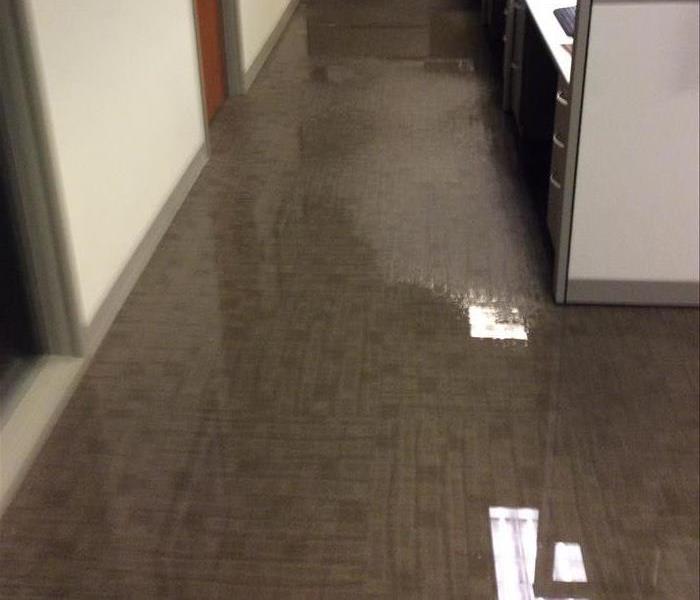 SERVPRO of Gainesville provides 24 hour fire and water damage restoration service in Hall County
SERVPRO of Gainesville provides 24 hour fire and water damage restoration service in Hall County
SERVPRO of Gainesville is available 24 hours a day for water emergencies, large or small. When you are dealing with water damage, immediate action is crucial. A delay of just a few hours can greatly increase the severity of the water damage.
We Answer the Phone Ready to Help
Call Today - (770) 536-1010
We understand that when you call us, you may be feeling confused, stressed, and vulnerable. You need an expert to guide you through this crisis. SERVPRO of Gainesville has the specific water damage training and experience to help you through this tough time. We specialize in water damage restoration—in fact, it's the cornerstone of our business.
What to Expect
When you call, we will ask several questions regarding your water damage emergency. These questions will help us determine what equipment and resources to bring, including how many trained SERVPRO Professionals may be needed.
Our SERVPRO Representative will ask several questions:
- Your name and contact information
- Your insurance information (if applicable)
- The street address of the water-damaged home or business
- When did the flooding or water damage occur?
- What caused the water damage (if known)?
- Is there electricity available (on-site)?
About SERVPRO of Gainesville
SERVPRO of Gainesville specializes in the cleanup and restoration of residential and commercial property after a fire, smoke or water damage event. Our staff is highly trained in property damage restoration. From initial and ongoing training at SERVPRO’s corporate training facility to regular IICRC-industry certification, rest assured our staff is equipped with the knowledge to restore your property.
SUMMER SHOWERS
4/5/2016 (Permalink)
In the event of water damaged caused by flooding our team is well equipped and well trained to make it "Like it never even happened." Here are a few tips to help get the situation under control until we get there:
1. Remove as much excess water as possible by mopping and blotting.
2.Remove and prop up wet upholstery cushions to help even out the drying process.
3. Try and wipe up the excess water from any wood furniture after removing all tabletop items
4. Do not leaves books, newspapers, magazines or other colored items on any flooring to avoid possible staining.
Call SERVPRO of Gainesville in the event of water damage. (770) 736-1010
Winterizing Pipes
11/30/2015 (Permalink)
Winterize your home before the cold sets in:
- The main valve - Know where the main water valve is located and confirm it turns easily. Don't wait until an emergency to find out.
- Pipe insulation - Insulate plumbing in drafty and unheated areas such as garages, outdoors, unfinished basements, and crawlspaces.
- Faucet drip - Leave a trickle of water running on faucets located on exterior walls to prevent pipes from freezing
- Open cabinets - Keep vanity doors under sinks open to allow heat inside.
- Garage door - Keep your garage door closed, when able, to maintain maximum heat.
- Cap bibs - Place insulation caps on hose bibs.
- The thermostat - Leave the termostat set no lower than 55 degrees F.
 The professionals at SERVPRO are available 24/7 to help combat damages caused by a flooded basement!
The professionals at SERVPRO are available 24/7 to help combat damages caused by a flooded basement!

 24/7 Emergency Service
24/7 Emergency Service
